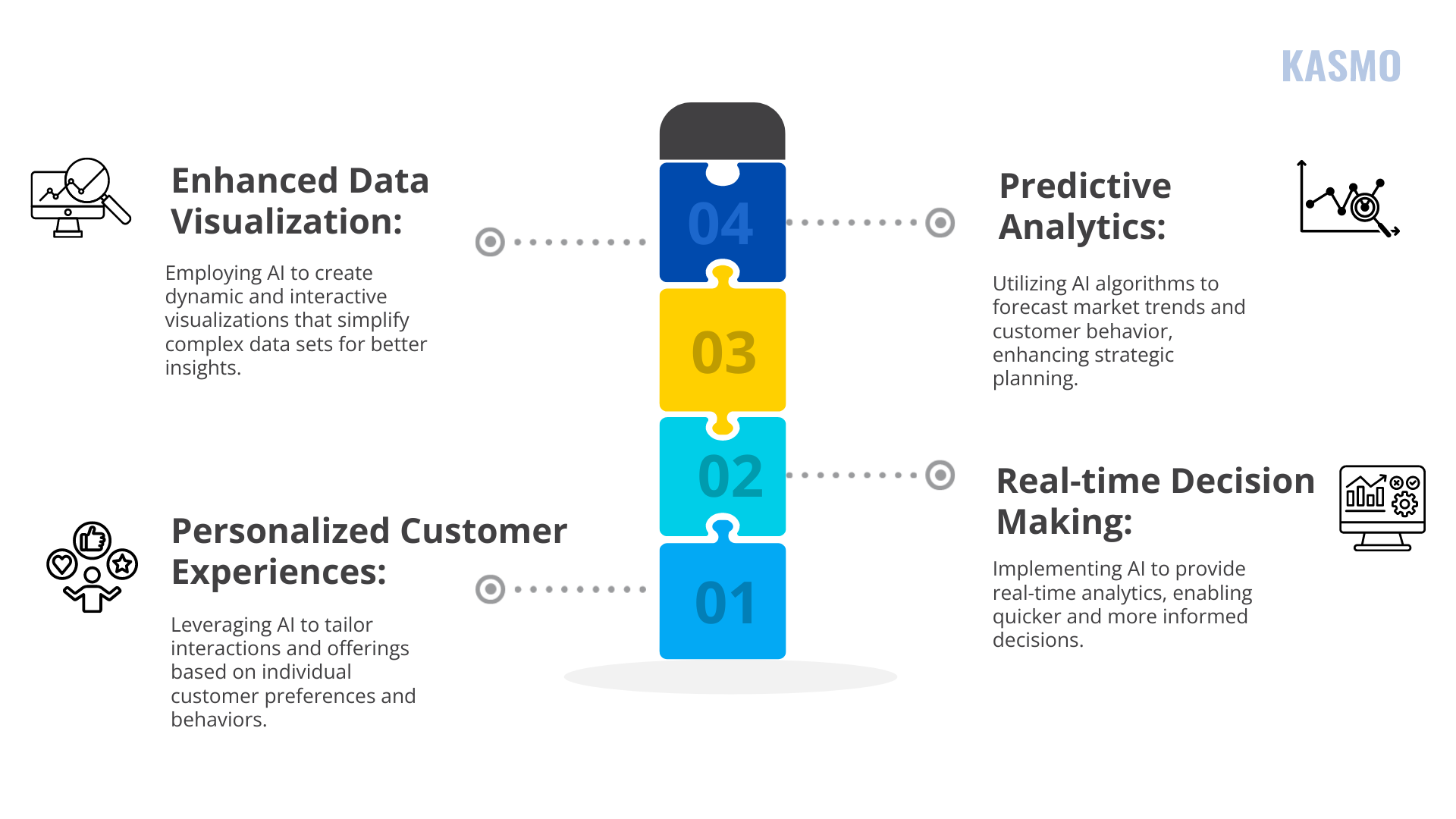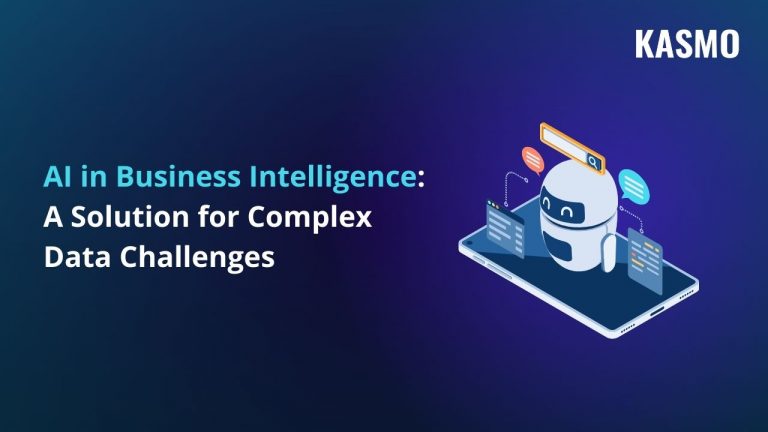Are you a business owner wondering how data can be turned into actionable insights? Integrating AI in Business Intelligence (BI) will let you achieve it with no difficulty. With advanced algorithms and machine learning techniques, businesses can quickly and easily take advantage of massive volumes of data to derive insights and build strategic business goals.
Companies investing in AI for Predictive Analysis, Natural Language Processing and automated reporting, can streamline operations and improve productivity. To thrive in this competitive market, companies need to use more AI-powered BI tools.
Using AI in business analytics enables companies to stay abreast of the upcoming market trends and predict future demands to help them take data-driven decisions.
Are you ready to leverage AI for your business intelligence tools? Read this blog to learn more!
Role of AI in Business Intelligence
According to Forbes, the global AI market size is projected to increase at a CAGR of 37.3% from 2023 to 2030. Using AI in business intelligence helps organizations enhance data analysis, automate tasks and gain deeper insights. Here are some key roles AI plays in BI:
- Data Processing and Analysis: By using historical data, AI algorithms can swiftly process it and create patterns and trends.
- Predictive Analytics: AI in business intelligence helps companies predict future trends. It mainly relies on both historical data and present data. AI-powered business tools make it easy for owners to make informed decisions regarding sales, customer experience, and predict market trends.
- Automation: AI in Business Intelligence can perform repetitive or manual tasks such as data entry, report generation and anomaly detection in less time. This facilitates employees to focus on more strategic work.
- Enhanced Decision-Making: Analyzing data with the help of AI allows businesses to gain real time insights, resulting in a more informed decision-making process.
- Personalization: To create more personalized customer experiences AI-powered BI tools understand customer preferences from pre-fed customer data. This creates increased customer satisfaction and loyalty.
- Natural Language Processing (NLP): AI integrated with NLP facilitates queries that can be asked in natural language. This makes it simple for non-technical users using BI tools to use and understand the data.
How Successful Organizations are Integrating AI in Business Intelligence?

Benefits of Using AI in Business Intelligence
Let’s take an in-depth look at the benefits of Using AI in Business Intelligence:
Enhanced Data Accessibility
AI business analytics facilitates business owners to analyze all types of data including images, videos, audio, IoT data and unstructured data. This data analysis helps the organization to attain a better scope of understanding business challenges and strategize solutions accordingly.
Accelerated Complex Analysis
Companies investing in AI can process large amounts of data sets at faster speed and get accurate patterns and insights that cannot be found in human data processing. This helps businesses integrate real time data into business intelligence systems.
Optimized Adaptive Learning and Performance
AI models have a unique framework that can learn and adapt without any extensive programming. This improves accuracy which gives a business the potential to build more valuable BI systems that develop along with the organization’s data.
Proactive Decision-Making
AI predictive models are based on historical and current data that can predict future situations for sales and market conditions. It allows organizations to anticipate and use emerging technological advancements as an opportunity.
Democratization of Data
AI in business intelligence democratizes data for everyone in an organization: from technical users, leaders to non-technical users. Companies investing in AI can innovate new products and services with
Challenges Organizations Face While Integrating AI in Business Intelligence
While AI significantly enhances BI with deeper insights and improved decision-making, several challenges remain:
- Data Quality: High quality data is crucial to drive insights. However, due to poor data architecture, organizations sometimes fail to accumulate high quality data.
- Cost: Developing and maintaining AI-powered BI tools can be expensive. Organizations must strategize keeping in mind to minimize costs and allocate resources accordingly to get the highest possible return on investment.
- Expertise: Till date many organizations lack the potential tools to successfully integrate AI in business intelligence due to lack of expertise. Companies investing in AI require skilled workers with the correct technical knowledge and skills.
How Snowflake Helps Organizations Build Strong Business Intelligence Program?
The Snowflake AI Data Cloud equips you with the essential data infrastructure and machine learning (ML) development tools needed to create AI applications and implement AI-driven business intelligence solutions. Snowflake simplifies the complexities of AI workflows, enabling you to swiftly build features, train models, and deploy them into production. This is all achievable using familiar Python syntax, without the need to move or copy data outside its governance boundaries.
Conclusion
Using AI in business intelligence helps organizations harness vast amounts of data and conduct an in-depth data analysis. AI optimizes BI with predictive analysis that allows organizations to get more accurate forecasts, leading to an efficient decision-making process. AI utilizes both historical and present data to draw an in-depth analysis. With AI-powered BI tools, businesses can get detailed data interpretation with engaging visualizations, natural language processing and user-friendly interface.
However, businesses undergo challenges that create hindrance while integrating AI with their business intelligence tools. Inaccurate and traditional data architecture prevents businesses from curating good quality data, leading to high expenditure. Snowflake AI Data Cloud understands these challenges and has a suite of resources and applications that can break down data silos and integrate external data and applications to curate accurate insights.



